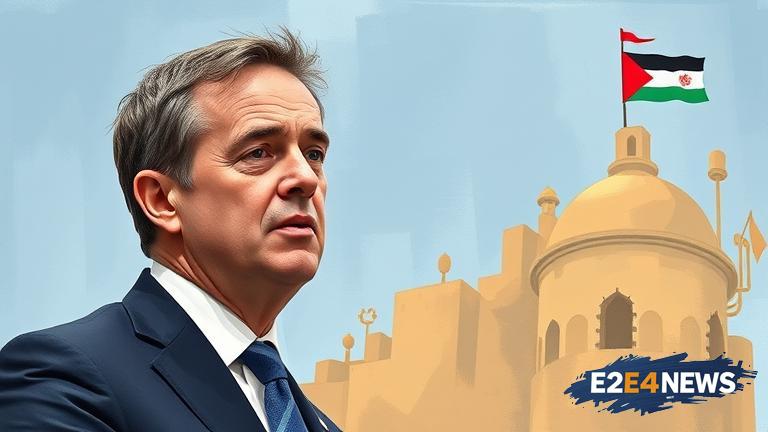Mark Carney, the former Governor of the Bank of England, has found himself at the center of a controversy following his comments on the Palestinian Gaza Strip. In a recent interview, Carney expressed his views on the situation in Gaza, which has been a longstanding point of contention between Israel and Palestine. The comments have sparked a heated debate on social media, with many taking to Twitter to express their opinions on the matter. Carney’s remarks have also been met with criticism from some politicians, who have accused him of being insensitive to the plight of the Palestinian people. The situation in Gaza has been a major point of concern for human rights organizations and governments around the world, with many calling for a peaceful resolution to the conflict. The Gaza Strip has been under a blockade by Israel and Egypt since 2007, which has had a devastating impact on the local economy and living conditions. The blockade has limited the flow of goods and people into and out of the territory, leading to widespread poverty and unemployment. The situation has been further complicated by the presence of Hamas, a militant Islamist group that has been designated as a terrorist organization by several countries, including the United States and Canada. Carney’s comments have been seen as an attempt to inject some nuance into the debate, but have ultimately been met with criticism from those who feel that he has not gone far enough in condemning the actions of Israel. The controversy surrounding Carney’s comments is just the latest example of the highly polarized nature of the debate surrounding the Israeli-Palestinian conflict. The conflict has been a major point of contention for decades, with both sides having deeply entrenched positions. The international community has been trying to broker a peace agreement between the two sides, but so far, a lasting resolution has proven elusive. The United States, in particular, has been a key player in the peace process, but its efforts have been met with limited success. The European Union has also been involved in the peace process, but its efforts have been hindered by the lack of a unified position among its member states. The situation in Gaza is just one aspect of the broader Israeli-Palestinian conflict, which has its roots in the early 20th century. The conflict has been marked by periods of relative calm, punctuated by outbreaks of violence and bloodshed. The most recent escalation of violence occurred in May 2021, when a surge in violence led to the deaths of hundreds of people on both sides. The conflict has also had a significant impact on the regional balance of power, with several countries in the Middle East having a stake in the outcome. The controversy surrounding Carney’s comments is a reminder of the highly sensitive nature of the debate surrounding the Israeli-Palestinian conflict. It is a topic that is deeply personal for many people, and one that is often marked by strong emotions and deeply entrenched positions. As the debate continues to rage on, it is clear that a lasting resolution to the conflict will require a significant amount of effort and compromise from all parties involved. The international community will need to play a key role in brokering a peace agreement, and will need to be willing to take a nuanced and balanced approach to the conflict. Ultimately, the goal of a peaceful resolution to the conflict will require a willingness to listen to and understand the perspectives of all parties involved, and to work towards a solution that is fair and just for all. The situation in Gaza is a complex and multifaceted issue, and one that will require a sustained and concerted effort to resolve. It is a challenge that will require the involvement of governments, civil society, and individuals from around the world, and one that will need to be approached with sensitivity, nuance, and a deep understanding of the complexities of the conflict.
